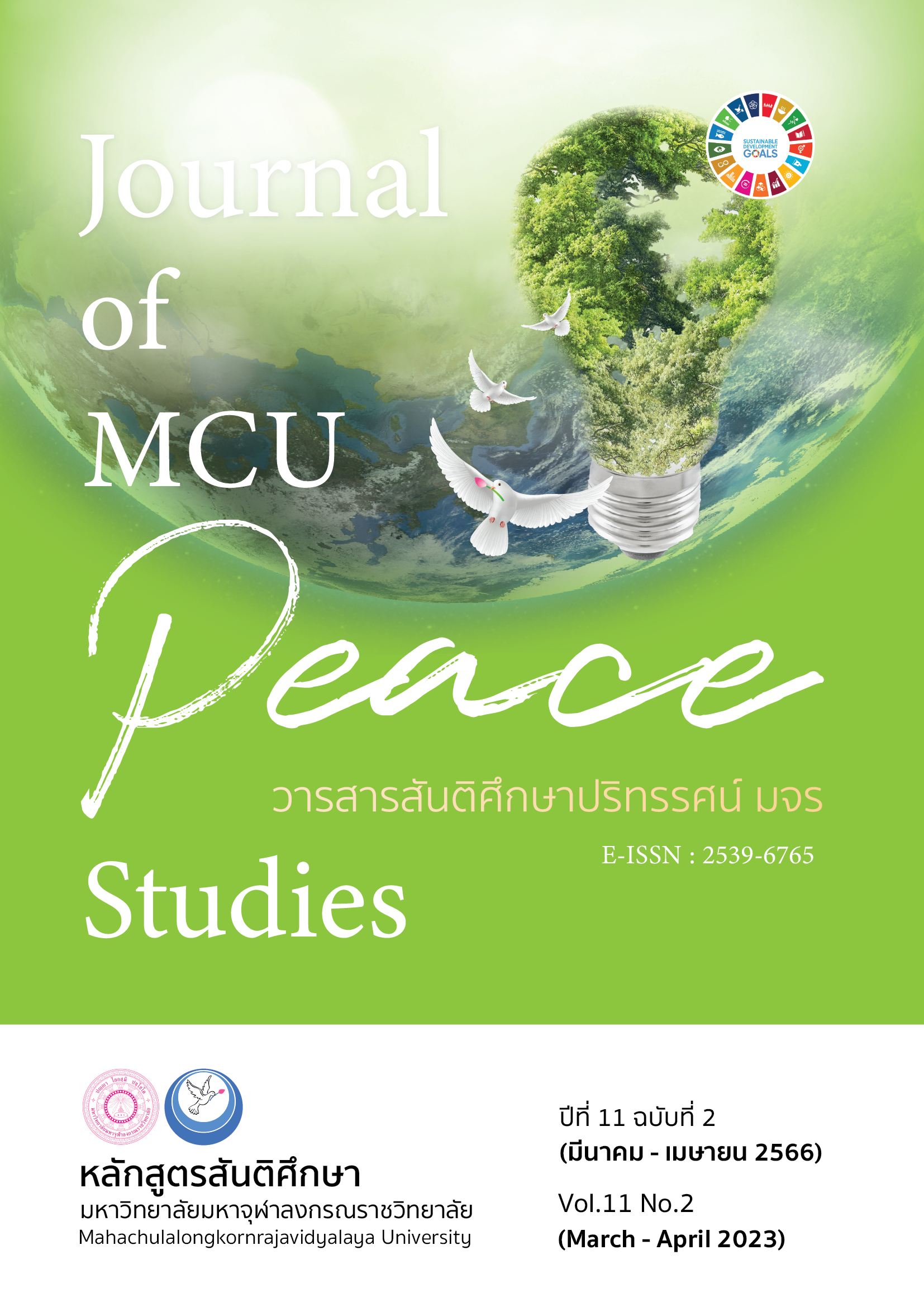การประยุกต์ใช้หลักสติเมื่อเผชิญภาวะเจ็บป่วยฉุกเฉินของผู้สูงวัย
Main Article Content
บทคัดย่อ
บทความวิจัยนี้มีวัตถุประสงค์ 1) เพื่อศึกษาแนวคิดเกี่ยวกับภาวะเจ็บป่วยฉุกเฉินของผู้สูงวัยตามศาสตร์สุขภาพสมัยใหม่ 2) เพื่อศึกษาหลักสติกับการดูแลสุขภาพตามแนวทางพระพุทธศาสนาเถรวาท 3) เพื่อประยุกต์ใช้หลักสติเมื่อเผชิญภาวะเจ็บป่วยฉุกเฉินของผู้สูงวัย เป็นงานวิจัยเชิงเอกสาร วิเคราะห์สรุปผล ด้วยวิธีการวิเคราะห์เนื้อหา
ผลการวิจัยพบว่า 1) แนวคิดตามศาสตร์สุขภาพสมัยใหม่ได้กล่าวถึงสภาวะเจ็บป่วยฉุกเฉินของผู้สูงวัยมี 2 ลักษณะ คือ 1. เจ็บป่วยฉุกเฉินที่มาจากโรคไม่ติดต่อเรื้อรังกลุ่ม NCDs (Non-Communicable Diseases) 2. เจ็บป่วยฉุกเฉินที่มาจากอุบัติเหตุ โดยมีรากเหตุที่มาจากการเปลี่ยนแปลงที่เสื่อมถอยทั้งด้านร่างกาย จิตใจ อีกทั้งบริบทสังคมที่เปลี่ยนไป ทำให้ผู้สูงวัยต้องอยู่เพียงลำพัง ประกอบกับการขาดความรู้ความเข้าใจการให้ความสำคัญในการดูแลใส่ใจสุขภาพเพื่อป้องกันตนเองจากภาวะเจ็บป่วยฉุกเฉิน 2) การดูแลสุขภาพตามแนวทางพระพุทธศาสนาเถรวาทให้ความสำคัญกับการใช้สติในการใส่ใจดูแลพัฒนาตนเอง 4 ด้าน คือ กาย สังคม จิต และปัญญา บนพื้นฐานความไม่ประมาทในการใช้ชีวิต 3) การประยุกต์ใช้หลักสติเมื่อเผชิญภาวะเจ็บป่วยฉุกเฉินของผู้สูงวัย สามารถนำมาใช้ทั้งในเชิงป้องกันและรับมือให้กับกลุ่มผู้สูงวัยที่ยังไม่มีโรคประจำตัวและมีโรคประจำตัว รวมถึงป้องกันอุบัติเหตุที่อาจเกิดขึ้นกับผู้สูงวัย โดยผ่านการฝึกเจริญสติ 4 ฐาน เพื่อให้เกิดความมั่นคงใน 4 องค์ประกอบชีวิต คือ ฐานกายด้วยการทานอาหาร การเคลื่อนไหวกาย การขับถ่าย การพักผ่อน การจัดสภาพแวดล้อมให้ปลอดภัย ฐานดำเนินชีวิตในสังคมด้วยการบริหารจัดการอารมณ์ตนเอง ฐานจิตด้วยการหมั่นเตือนตนด้วยมรณานุสติ ฐานปัญญาด้วยการหมั่นตรวจสุขภาพตนเอง องค์ความรู้วิจัย “OCFE Model” คือ Observation การสังเกต Calling การระลึกรู้ First Aid การปฐมพยาบาลตนเอง และ Emergency Medical Services การรอหน่วยแพทย์ฉุกเฉินอย่างมีสติ
Article Details

อนุญาตภายใต้เงื่อนไข Creative Commons Attribution-NonCommercial-NoDerivatives 4.0 International License.
ทัศนะและความคิดเห็นที่ปรากฏในบทความในวารสาร ถือเป็นความรับผิดชอบของผู้เขียนบทความนั้น และไม่ถือเป็นทัศนะและความรับผิดชอบของกองบรรณาธิการ ยินยอมว่าบทความเป็นลิขสิทธิ์ของวารสาร
เอกสารอ้างอิง
Chaichan, M., Wongsaree, C., & Praneetham, W. (2018). Nurse’ Role in Caring for Person with Accident at the Scene. EAU Heritage Journal Science and Technology, 12(3), 71-82.
Khanana, N. et al. (2020). An Application of Buddha’s Teaching on the Mindfulness Death in Daily Life. Journal of MCU Nakhondhat, 7(5), 118-131.
Lenghee, A., & Boonma, P. (2020). The Elderly’s Environment in Residence at Risk of Falls: A Case study of Maeka Sub-district, Muang District, Phayao. Built Environment Inquiry Journal, 19(3), 44-60.
Mahachulalongkornrajavidyalaya University. (1996). Thai Tripitakas. Bangkok: MCU Press.
Mooltha, K. (2017). The Study of the Way of Mindfulness Training in Daily Life According to Teaching of Luang Por Tien Cittasubho. Academic MCU Buriram Journal, 2(1), 33-40.
National Statistical Office. (2021). Aging Society. Retrieved October 10, 2021, from http://www.nso.go.th/sites/2014/Pages/Press Release/2561/N10-04-61-1.aspx
Ninlawan, N. et al. (2020). An Application of Four Bhãvanãs in Theravada Buddhism into the Society of Elderly. Journal of MCU Nakhondhat, 7(3), 39-49.
Phra Natthawut Phanthali et al. (2021). Anapanasati: Breath of Awakening According to Buddhism Principle. Buddhism in Mekong Region Journal, 4(2), 1-13.
Phra Supakit Supanyo. (2021). The Application for Mindfulness Clear Comprehension in Living Daily Life. Journal of Political Science, 4(2), 99-107.
Phrakhru Kittichaiyaka et al. (2020). A Model of Health Promotion According to 4 Development (Bavana) Principles for the Senior School of Wat Nong Mai Kaen, Thamaka District, Kanchanaburi Province. Journal of MCU Nakhondhat, 7(12), 222-237.
Phrakhru Silavatpaphakorn et al. (2021). Self-Preparation in the End of Life with Consciousness. Journal of Graduate MCU KhonKaen Campus. 8 (3), 101-112.
Phugkaew, V. (2020). A Model of Mindfulness Development to Promote the Peaceful Well-Being for the Dependent Elderly. Journal of MCU Peace Studies, 8(Supplement Issue), 109-120.
Phumngam, T., & Ragkhanto, S. (2021). Buddhist Approach for Holistic Health of Elderly. Journal of MCU Humanities Review, 7(1), 469-470.
Prachabutr, U., & Kingkham, W. (2021). A Study of Relationship Between Anapanassati and Three Characteristics in Theravada Buddhist Scriptures. Journal of Palisueksabuddhaghosa Review, 7(2), 2-12.
Singhkrittaya, B. (2019). The Process of Health Promotion in Non-Communicable Diseases Patients on Buddhist Integrated Pharmaceutical Sciences. Journal of Graduate Studies Review, 15(3), 87-99.
Suttijit, P. et al. (2019). An Application of Satipatthana in Tai-Chi Exercise for Enhancing Elderly Holistic Health. Journal of MCU Nakhondhat, 6(10), 4898-4913.
Tanthatame, K. (2018). The Basic Needs of Elderly Daycare Services at the Elderly Development of Quality of Life Center in Ratchaburi Municipality. Region 4-5 Medical Journal, 37(1), 56-65.
Tanuchit, S. et al. (2019). The Situations of Emergency Medical Services Associated with Elderly Falls in Thailand. Journal of Professional Routine to Research, 6, 57-68.
Thai Health Promotion Foundation. (2021). Non-Communicable Diseases. Retrieved October 10, 2021, from https://www.thaihealth.or.th
Thai Health Promotion Foundation. (2021). Non-Communicable Diseases. Retrieved November 24, 2021, from http://www.thaihealth.or.th/microsite/categories/5/ncds/2/173/176


